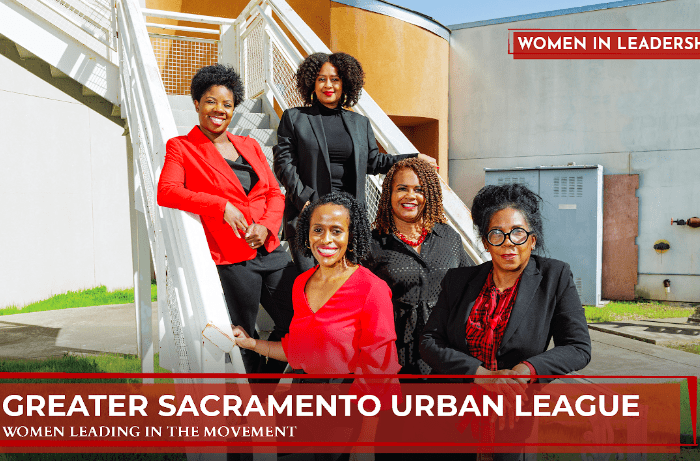Since 1968, the Greater Sacramento Urban League (GSUL) has been committed to educating, empowering and employing diverse populations throughout the Sacramento region by helping individuals gain meaningful employment, access safe and affordable housing, reach their educational pursuits, overcome health disparities and build generational wealth.
In its 55-year history, the non-profit, community-based organization has been spearheaded by two female CEOs, the late Delores Bryant (1972-1979) and Cassandra Jennings (2016-2021). Today, a group of women in leadership at GSUL work to uphold the organization’s pledge to empower communities and change lives by mentoring youth, advocating for families, and fostering female leadership and business development.
“GSUL’s Youth and Families Center in Oak Park aims to provide a safe and reliable space for youth and their families to receive culturally responsive resources, mentorship, and wraparound support,” says Dr. Jahmese Williams, Executive Vice President. Currently, the GSUL Oak Park office serves as one of seven community incubators selected by the Black Child Legacy Campaign to implement measures for the reduction of Black infant and maternal mortality rates.
“Programs like Healing the Hood, Black Boys Build, Black Girls Heal, and Kings and Queens Rise provide a safe space for youth to gather, talk and learn from each other’s experiences, while building leadership skills and boosting their self-esteem,” says Jedida S. Gomes, Director of the Youth and Families Center.
In addition to these programs, GSUL has set its sights on broadening the Youth and Families Center. It envisions a future where Black and other marginalized youth in the Oak Park neighborhood can access expanded educational and employment opportunities provided by the Urban League. “Located on Alhambra Boulevard, our office presently functions as a shared commercial office space, but we’re eager to assume the entire building this spring and fill a gap in services much needed in the Oak Park community,” says Dr. Williams.
Soon, the site will serve as an allcove youth drop-in center, designed with, by, and for youth ages 12 to 25 to increase accessibility to affordable mental health and wellness services. In partnership with Sacramento County and Stanford University, GSUL will facilitate as the lead organization for allcove’s first Sacramento-based location to help meet the evolving needs of young people in the region.
The expanded Oak Park office will also offer youth employment and workforce training, support services to bolster the academic success of foster youth, as well as a youth-led cohort-based, social change program that will explore solutions to substance abuse-related problems identified in the community.
“GSUL is in a pivotal position to amplify a unique opportunity to shape the next generation of female leaders of color in Sacramento,” says Chief Operations Officer DeNelle Ellison, who previously worked for the agency from 2004-2009 and rejoined the leadership team in 2017. “As Black women, our leadership team has experienced many of the challenges, barriers and triumphs that young girls of color experience today.”
Ellison, who served as Interim President of GSUL in 2021-2022, is confident the organization is also well equipped to support Black women enterprises who notably suffered during and after the pandemic.
With nearly 2.7 million businesses nationwide, Black women are the fastest growing group of entrepreneurs in the U.S.[1] and account for 36% of all Black-owned businesses. Yet Black women-owned businesses face a disproportionate set of financial difficulties. GSUL is working with the California Black Chamber of Commerce to provide Black business owners with strategic guidance to improve their business trajectory and ensure they succeed.
With a long history of women in leadership as well as programs and services focused on female empowerment, the Greater Sacramento Urban League practices what they preach.
American Express, “The 2019 State of Women-Owned Businesses Report.” (September 2019)
USA Facts, “A higher share of Black-owned businesses are women-owned than non-Black businesses.” (August 2020)
